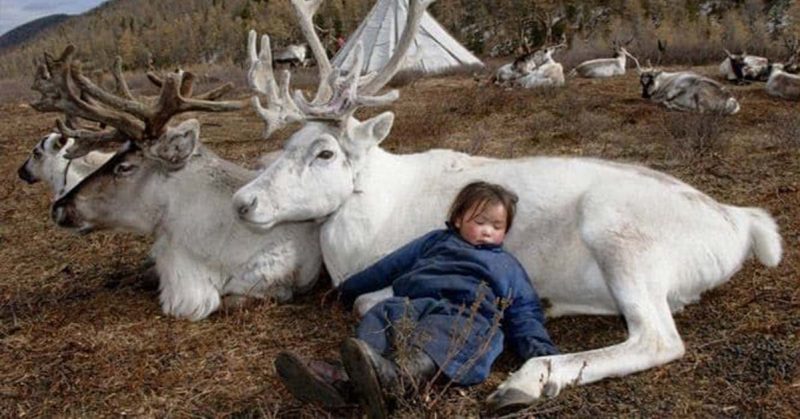These incredible people are proof that you can live without a smartphone or satellite TV and still be happy.
Photographer and anthropologist Hamid Sardar-Afkhami has toured the world for over a decade and everywhere he goes, he immerses himself into the culture to better understand the people and make every photo worth the trip. In a tour of the East Asian country of Mongolia, Hamid visited the lost tribe of Dukha and documented some incredible photos that prove that life outside of civilization isn’t so bad after all. [1] He spent several years with the Dukha and was fully absorbed into their simple ways of communal living.


The Dukha people, also known as the Tsataans are part of a Tuvan-Turkic ethnic group that has resided for thousands of years in a desolate area on the border of Mongolia and Russia. [2] They descended mostly from natives Russia’s Siberia and Khvosgol, a northern province in Mongolia. The Dukha are a nomadic people who live in remote forests and move from one pasture to the other about five to ten times a year, usually every seven to ten weeks.
Their way of life hasn’t changed much from what it was hundreds of years ago, only that they wear modern clothing now.
They are mostly known for herding reindeer, a way of life that even the youngest Dukhans are exposed to from birth. Reindeers are docile animals and gentle companions. When the animals are still too young to be ridden by adults, they are groomed and trained by children. The Dukha people typically hunt for food and also as a means of livelihood.
They raise the reindeer primarily for their milk, yogurt, and cheese, which are staple foods in the Dukhan diet. They offer reindeer rides to tourists and sell the animals to traders from the cities and other communities. The animals are a common mode of transportation amongst the people.
They do not eat the reindeer, except if an animal is sick, wounded, or no longer useful to them. The Dukhans believe that if the reindeer are extinguished from their tribe, their culture will disappear forever.

They are spiritual people who believe they have a supernatural connection to wildlife, and I don’t doubt them for a second!
The Dukha people aren’t just hunters and reindeer herders. They train wolves, bears, and eagles. The eagles are reared to help them in hunting and this art is considered a mark of greatness in the tribe. Only the truly remarkable members can successfully train eagles.



A people on the verge of extinction
The people of Dukha are said to be hospitable and welcoming to visitors. They are currently a very tiny population of about 282 people (according to the last census in 2010) and fewer than 44 families, from a former count of almost 200 families. Their numbers have greatly dwindled since the past few centuries, and the reindeer population is dwindling as well.
“They’re certainly a dying culture,” says Hamid to CNN. He explains that most of the migrations are caused by attraction to civilization and modern living away from the extremely cold forests.
“The number of families has fallen because a lot of them have been synthesized with the mainstream community,” he says. “Many of them have moved to the towns and even to the capital cities. The biggest threat in Sardar-Afkhami’s view is the defection from the younger Dukha generation, who don’t want to live in the harsh conditions in the taiga (or “snow forest”). They want to go down and stay in warm cabins in the winter, maybe buy a car and drive. There’s a big appeal to the modern life. The hardships of the traditional life as a reindeer herder certainly play a factor.” [3]
Hamid also believes that the government’s decision to close off the Dukhans’ hunting ground as a national protected park has contributed to the rapid population depletion. The Dukhans are traditional hunters who also need vegetation for their reindeer to graze.
“When you pay them off like that, you’re destroying a part of their culture,” Hamid said. Sadly, the reindeer are dying rapidly from diseases and unavailability of medication.
Decline in tourism
Tourism has also become a failing venture for the Dukhans. They offer deer-rides, horse-rides, pictures and tours of their camps to tourists who come from all over the world. The reindeer are the most interesting elements of tourism for the Dukha. People would pay 5,000 Mongolian tugrik ($2.50) to get a few pictures with the gentle animals. They make an average of $200 a day from tourism.
However, they’ve been criticised for using the reindeer as bait to attract people to their camps. Popular travel companies have begun to discourage clients from visiting the Dukha.
“Many travelers are of the opinion that this area isn’t the best environment for the reindeer as they’re native to much colder climates and are brought to Lake Khovsgol so the herders can benefit from tourism,” says Timur Yadamsuren, a spokesperson for Intrepid Travel in Mongolia. “For these reasons Intrepid Travel doesn’t recommend this activity.”
Enkhatuya, a leader of a group of Dukhans who have settled on the outskirts of the forests, close to Lake Khovsgol insists that the reindeer are treated like family and are well cared for.
“As a culture we’ve deep connections with our reindeer,” she said. “They’re like our family. We would never abuse them as such. I can assure you they aren’t suffering.”
Enkhatuya is convinced that the community will thrive again as the younger generation has slowly begun to come back home.
“Our young people are returning to continue our ancestral tradition,” she says. “They’re as close to the tribe and culture as they ever were. They’re continuing to speak our native language.”
Hopefully, the community will thrive once again and repopulate. It brings me a sense of peace to know that there is a tribe so beautiful, peaceful, subsistent, and content with their way of life out there, cut off from the harsh realities of civilization.




Photos: Hamid Sardar Photo
References
- ” The Everyday Life Of Reindeer People Living In Mongolia. “Bored Panda. Dovas. Retrieved December 19, 2019.
- “Incredible photos of a lost Mongolian tribe.” Business Insider. Sophie-Claire Hoeller. September 20, 2016.
- “The Dukha: Last of Mongolia’s reindeer people.” CNN. Nila Sweeney. September 29, 2016.


